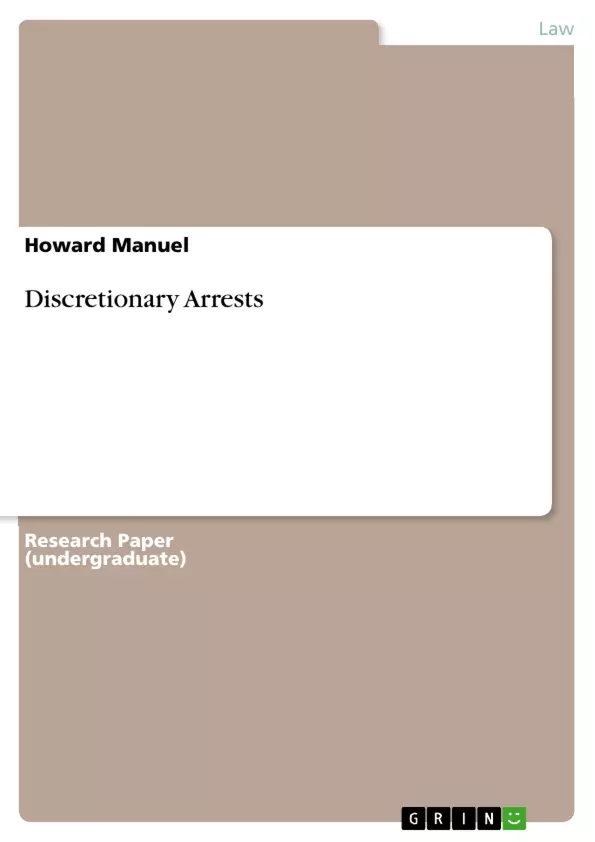The article discusses the need for law enforcement to have the power to arrest individuals for non-jailable misdemeanor offenses. Additionally, whether this power is in violation of constitutional rights to be free from unwarranted arrest and seizure.
Inhaltsverzeichnis (Table of Contents)
- INTRODUCTION
- 1. BACKGROUND
- History of policing
- Defining Discretion
- Reasoning for discretion
- 2. STATEMENT OF THE CASE
- Procedural History
- Factual Background of Atwater
- Supreme Court Ruling
- Dissenting Opinion - Justices Breyer, Ginsburg, O'Connor, and Stevens
- 3. ARGUMENT
- The decision in Atwater gives permission for police intrusion
- Research documents an epidemic of unnecessary arrests for minor offenses
- Atwater shows the need for an unambiguous bright line rule
- 4. CONCLUSION
Zielsetzung und Themenschwerpunkte (Objectives and Key Themes)
This article aims to provide a comprehensive analysis of the decision in Atwater v. City of Lago Vista and its implications for police discretion. The article argues that the Supreme Court's decision has broadened the scope of police power and has led to an increase in unnecessary arrests for minor offenses. It also explores the historical context of policing and discretion, as well as the potential consequences of unchecked police discretion.
- The impact of the Atwater decision on police discretion
- The history of policing and the evolution of police discretion
- The dangers of excessive police discretion
- The need for a clearer legal framework to regulate police discretion
- The role of prosecutors and courts in mitigating the effects of police discretion
Zusammenfassung der Kapitel (Chapter Summaries)
The introduction sets the stage for the article by discussing the implications of the Atwater decision for the balance between police power and individual rights. It highlights the potential for abuse of power that arises when police officers have too much discretion in enforcing the law. The first chapter delves into the history of policing, tracing its evolution from early colonial days to the modern police force. This section explores the development of police discretion as a necessary tool for law enforcement, but also highlights the potential for this discretion to be misused.
The second chapter presents a detailed analysis of the Atwater case itself, outlining the legal arguments and the Supreme Court's decision. It then examines the dissenting opinions from the Justices who disagreed with the majority's decision. Chapter three focuses on the implications of the Atwater decision. It argues that the decision has led to an increase in unnecessary arrests for minor offenses, and that this trend undermines the Fourth Amendment protection against unreasonable searches and seizures.
Schlüsselwörter (Keywords)
Police discretion, warrantless arrest, Atwater v. City of Lago Vista, Fourth Amendment, probable cause, misdemeanor offenses, police intrusion, unnecessary arrests, bright line rule, judicial oversight.
Frequently Asked Questions
What is the main issue discussed in the Atwater v. City of Lago Vista case?
The case addresses whether the Fourth Amendment forbids a warrantless arrest for a minor, non-jailable misdemeanor offense, such as a seatbelt violation.
What was the Supreme Court's ruling in Atwater?
The Supreme Court ruled that if an officer has probable cause to believe that an individual has committed even a very minor criminal offense in his presence, he may, without violating the Fourth Amendment, arrest the offender.
What are the dangers of excessive police discretion?
Excessive discretion can lead to unnecessary arrests for minor offenses, potential abuse of power, and intrusion into individual privacy rights protected by the Fourth Amendment.
What is a "bright line rule" in the context of policing?
A bright line rule is a clearly defined legal standard that leaves little room for interpretation. Critics of the Atwater decision argue that a clearer rule is needed to limit when police can make arrests for minor crimes.
How has the Atwater decision impacted the Fourth Amendment?
The article argues that the decision has broadened police power and potentially weakened protections against unreasonable searches and seizures by allowing arrests for offenses that do not carry jail time.
- Quote paper
- Howard Manuel (Author), 2011, Discretionary Arrests, Munich, GRIN Verlag, https://www.grin.com/document/197559



